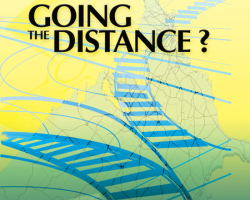Category of Content
Siting Experience Documents Only
Publication Date
Subject Matter
Keywords
M4SF-19ID020303045- Atlas Railcar Phase 3 Final Report
M4SF-19ID020303045- Atlas Railcar Phase 3 Final Report
Performance Specification for Standardized Transportation, Aging, and Disposal Canister Systems
Performance Specification for Standardized Transportation, Aging, and Disposal Canister Systems
Appendix B – Revised Railcar-to-Cradle Attachment Interface
Appendix B – Revised Railcar-to-Cradle Attachment Interface
Appendix D – Revised Conceptual Cradle Design Family 4
Appendix D – Revised Conceptual Cradle Design Family 4
Standardized Transportation, Aging, and Disposal Canister Feasibility Study
Standardized Transportation, Aging, and Disposal Canister Feasibility Study
Know your rights: Earth jurisprudence and environmental politics
Know your rights: Earth jurisprudence and environmental politics
Two Andean countries – Ecuador and Bolivia – have politically recognized the rights of nature, an idea that is also gaining traction at the sub-federal in the United States. The origins of the concept can be traced to the cultures of indigenous peoples of the Americas as well as to the work of American legal scholar Christopher Stone. Recognition of nature’s rights holds out the possibility of an alternative approach to environmental management and politics, as well as to a fundamentally redefined relationship between nature and society.
The Social and Ethical Aspects of Nuclear Waste
The Social and Ethical Aspects of Nuclear Waste
Nuclear waste management seems to exist in a perpetual state of crises. For 50 years the nuclear states of the world have fought, and generally lost, the battle to deal with the nuclear waste problem. Worldwide, there is a growing acknowledgement within industry and government that social and ethical issues are just as important as technical issues when developing safe programs for nuclear waste management. This paper is a review of some of the outstanding social and ethical issues that are influencing discussions on nuclear waste management around the world.
United Nations Declaration on the Rights of Indigenous Peoples
United Nations Declaration on the Rights of Indigenous Peoples
The General Assembly, Taking note of the recommendation of the Human Rights Council contained in its resolution 1/2 of 29 June 20061 , by which the Council adopted the text of the United Nations Declaration on the Rights of Indigenous Peoples, Recalling its resolution 61/178 of 20 December 2006, by which it decided to defer consideration of and action on the Declaration to allow time for further consultations thereon, and also decided to conclude its consideration before the end of the sixty-first session of the General Assembly, 1 See Official Records of the General Assembly, Sixty-first S
Free Prior and Informed Consent: An indigenous peoples’ right and a good practice for local communities
Free Prior and Informed Consent: An indigenous peoples’ right and a good practice for local communities
This Free, Prior and Informed Consent (FPIC) Manual is designed as a tool for project practitioners (herein referred as project managers) for a broad range of projects and programmes (hereinafter to be referred to as projects) of any development organization, by providing information about the right to FPIC and how it can be implemented in six steps.
Transportation Planning: Indigenous Dialogue
Transportation Planning: Indigenous Dialogue
In 2019, the NWMO commissioned Maawandoon Inc to lead Indigenous Dialogue session to support NWMO’s transportation planning for the long-term care of Canada’s used nuclear fuel. This research built upon and complemented public attitude research carried out in 2017 and 2018. The research methodology consisted of 7 Indigenous dialogue sessions and attendance at 3 Indigenous Annual General Assemblies (AGA)/meetings with dialogue components.
Topical Analysis of Nuclear Experts' Perceptions of Publics, Nuclear Energy, and Sustainable Futures
Topical Analysis of Nuclear Experts' Perceptions of Publics, Nuclear Energy, and Sustainable Futures
Nuclear energy experts consider commercial power from fission to be a strong contender to help mitigate the increasing effects of climate change, in part due to its low-to-no carbon emissions. Nevertheless, nuclear energy's history, including meltdowns such as Three Mile Island, Chernobyl, and Fukushima, and dumping in sacred Indigenous land such as Yucca Mountain, raises important concerns in public deliberation over nuclear power.
Going the Distance? The Safe Transport of Spent Nuclear Fuel and High-Level Radioactive Waste in the United States - Summary
Going the Distance? The Safe Transport of Spent Nuclear Fuel and High-Level Radioactive Waste in the United States - Summary
This new report from the National Research Council’s Nuclear and Radiation Studies Board (NRSB) and the Transportation Research Board reviews the risks and technical and societal concerns for the transport of spent nuclear fuel and high-level radioactive waste in the United States. Shipments are expected to increase as the U.S. Department of Energy opens a repository for spent fuel and high-level waste at Yucca Mountain, and the commercial nuclear industry considers constructing a facility in Utah for temporary storage of spent fuel from some of its nuclear waste plants.
Transportation Institutional Issues Involving the U.S. Department of Energy's Civilian Radioactive Waste Management Program: The Post Yucca Mountain Years
Transportation Institutional Issues Involving the U.S. Department of Energy's Civilian Radioactive Waste Management Program: The Post Yucca Mountain Years
This 10th anniversary update to the original archive adds several sections that cover relevant topics since 2010. Some of the new topics include the Blue Ribbon Commission on America's Nuclear Future, consent-based siting, tribal engagement, shutdown site visits, and industry interests. Much like the first publication, the purpose of this update is to make it easier for new personnel to learn about what came before them in the hope that this knowledge gives them a greater chance of success.


